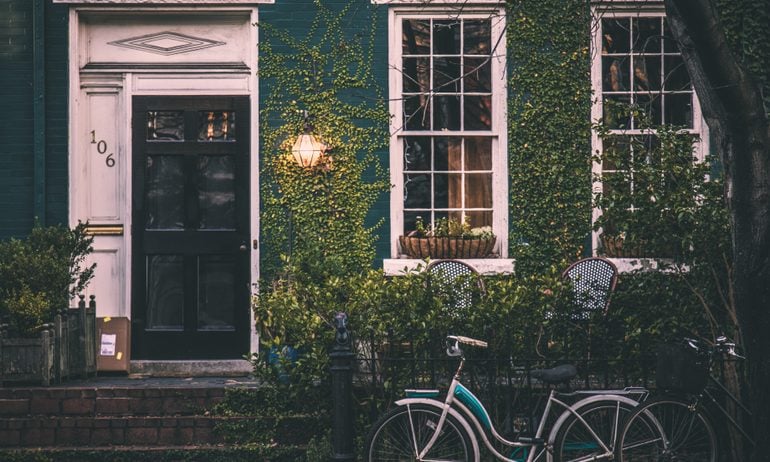How to Save for a House: A Step-by-Step Guide
You can slay your savings goals without putting the rest of your life on hold.

Some or all of the mortgage lenders featured on our site are advertising partners of NerdWallet, but this does not influence our evaluations, lender star ratings or the order in which lenders are listed on the page. Our opinions are our own. Here is a list of our partners.
A down payment is often the biggest expense, but you’ll need money for closing costs and moving, too.
Small steps add up. Scour your budget for ways to save. Make your savings automatic through direct deposit.
Put your savings to work in a high-yield savings account, money market account or a certificate of deposit.
See if you qualify for first-time home buyer assistance, like grants, low-interest loans or tax credits.
A down payment is often the biggest expense, but you’ll need money for closing costs and moving, too.
Small steps add up. Scour your budget for ways to save. Make your savings automatic through direct deposit.
Put your savings to work in a high-yield savings account, money market account or a certificate of deposit.
See if you qualify for first-time home buyer assistance, like grants, low-interest loans or tax credits.
Saving enough money to buy a house might seem like scaling a financial Mount Everest, but don't let that stop you from taking the first steps. Once you get moving, you might find the peak more accessible than you expected.
Here's how to begin the climb.
1. Set a goal for how much money to save
Homebuying costs, such as the down payment and closing costs, are often expressed as a percentage of the home price. First, determine an affordable price range for your house hunt. (Need help? Use our calculator to see how much house you can afford.) Then, with a purchase price in mind, you can set a specific savings goal.
The biggest hurdle is often the down payment — so let’s start there.
Saving for a down payment
The down payment is the upfront cash you pay to buy a house. Then, you finance the rest of the house with a home loan, or mortgage. Requirements differ by loan type, but your down payment can be as low as 3%, especially if you've got a solid credit score and manageable debts.
To save for a down payment, start by knowing the minimum requirement for the type of loan you plan to get. Common mortgages include:
Conventional loans. Most mortgages are conventional loans, which adhere to conforming loan standards set by Fannie Mae and Freddie Mac. These standards can make qualifying for a conventional mortgage harder. However, with some conventional loan programs, you can make a down payment as low as 3%.
FHA loans. FHA loans are backed by the Federal Housing Administration and require as little as 3.5% down. Required down payment amounts vary by credit score, however.
VA loans. Backed by the U.S. Department of Veterans Affairs, VA loans let borrowers skip the down payment. VA loans are limited to current and former U.S. service members and qualifying spouses.
USDA loans. USDA loans, which are backed by the U.S. Department of Agriculture, usually don't require a down payment. These loans are for borrowers in rural and suburban areas and can have income limits.
Jumbo loans. Mortgages that go beyond conforming loan limits are called jumbo loans. Because these mortgages can't be insured or backed the way other loans can, lenders often require higher down payments, starting at 10%.
It's a common misconception that you need to make a 20% down payment on a mortgage. Putting 20% down will allow you to avoid paying for private mortgage insurance, but it’s not required. The average down payment on a house is much less: First-time buyers put down a median 8%.
Maybe you already have some money saved. Wondering how far it’ll go? NerdWallet’s down payment calculator can help you see your savings as a percentage of different home prices.

Saving for closing costs and other expenses
The down payment is the biggest expense, but it’s not the only one. You’ll also need to budget for:
Closing costs. These are the fees you pay to finalize a mortgage and are typically about 2% to 6% of the loan amount. A closing costs calculator can help you estimate how much you’ll pay for different home prices.
Moving and other expenses after you buy the home. Even if the house is in turnkey condition, you may find yourself making a surprising number of trips to hardware and home furnishing stores. Learn how much it costs to move.
Once you have a rough estimate for each expense — down payment, closing costs and other cash to have on hand — add it all up. That big number is your savings goal.
Treasury Bills or HYSA: Which grows your down payment faster?
With yields that beat most high-yield savings accounts, the Atomic Treasury account can offer a smarter way to save. Plus, earned interest is exempt from state and local taxes.
2. Tighten your budget
You don't have to give up lattes — the cost of a coffee or two a week won't finance a home anyway. But minimizing other expenses may help you save for a house faster. Here are a few places to look:
Compare car insurance rates to get the best deal.
Find out if you can save by bundling your cable and internet services or changing your cell phone plan.
Refinance your student loans or refinance your auto loan to lower the monthly payments.
Cancel subscriptions you're not using.
To find other ways to reduce expenses, track your spending for a month to see where your cash goes.
» MORE: See even more ways to save money
3. Save raises and windfalls
Transfer any extra money to your house savings before you get a chance to spend it. That might include:
A tax refund or credit.
A raise or bonus from work.
An inheritance.
Birthday, holiday or wedding gift money.
If you use gift money for your down payment, you'll usually have to document how you got the funds. If you're fortunate enough to receive it, gift money must be an outright gift — not a loan. Specific rules for using gift money vary by loan program, so ask your loan officer what to expect.
4. Earn extra money
Look for ways to make some extra cash when saving up for a house, such as doing freelance work online, making deliveries or trading in old phones and electronics.
Just beware of scam "opportunities" that ask for upfront money or financial information. Check out any companies before hopping on board, and learn to spot the signs of a financial scam.
5. Automate your savings
It’s easiest to save when you’re not even thinking about it. Try these tricks:
Set up automatic transfers. Make saving easier by scheduling a transfer from your checking to your savings account. Set it up to deposit a little bit every month, every week or whatever rhythm works for you. Your employer also might let you set up a direct deposit split, so some of your paycheck goes directly into your savings account.
Stash spare change. No, not in a piggy bank (though you can do that too, if you want). A variety of banks and budgeting apps allow users to round up card purchases to the nearest dollar and put the change in a linked savings account.
Use a cash-back credit card. You guessed it — put that cash back toward your down payment fund. To maximize your cash back, put as many purchases as possible on your cash-back credit card, making sure to pay it off each month so that interest charges don't decimate your earnings.
6. Keep your savings in the right account
You're setting aside as much as you can to meet your goal. Now, let your money work harder for you by letting it grow in an interest-bearing account. To compare options, look at an account's annual percentage yield (APY). This reflects the amount of interest you would earn in your bank account balance over one year. A higher APY means your money grows faster.
Where should you put money when saving for a house? Here are a few options:
Best accounts to save for a house
High-yield savings accounts. It’s a great time to open a high-yield savings account: Today’s best rates are around 5% APY, many times higher than traditional savings accounts’ rates of around 0.01% APY. With easy access, total liquidity and FDIC insurance, high-yield savings accounts are a solid place to grow your down payment savings.
Money market accounts. A money market account can also be a good option for the short-term saver. Money market accounts are insured and offered by banks and credit unions. As with savings accounts, it takes a bit of shopping to find decent returns, so see which option earns you the highest rate.
Certificates of deposit. Once you have a good-sized chunk of savings, you could open a certificate of deposit timed to mature around the time you expect to have the bulk of your down payment saved. CDs offer a slightly higher rate than savings accounts or money markets. The money is generally inaccessible for the term — six months, a year or even more — unless you pay a penalty to withdraw it.
With interest rates at over 20-year highs, it’s a great time to consider one of these options to grow your savings: See NerdWallet’s picks for best high-yield savings accounts, best money market accounts and best CD rates.
Should you invest to save for a house?
The stock market is too volatile for short-term savings, so unless your target date for buying a home is way down the road — say, 10 years or more — it’s wise to pursue a more stable option instead. One severe market downturn can set you back significantly, not to mention discourage your ongoing efforts.
7. Resist dipping into your other savings
It's tempting — after all, the money's right there — but try to avoid taking your down payment from existing savings that you have earmarked for other goals. That includes:
Your emergency fund. Yes, it's money you've set aside in case you need it, but your emergency fund might come in handy while you're buying a house. For example, you might need to cover an appraisal gap or pay for a pricey repair soon after moving day.
Your 401(k). Taking a loan from a 401(k) is risky. If you lose your job, the loan must be repaid by the next tax-filing deadline or it will be taxed as ordinary income, with a 10% penalty if the withdrawal is taken before age 59½. While you might be able to make a 401(k) early withdrawal without penalty under a hardship withdrawal exemption (buying a house counts as an "immediate and heavy financial need," per the IRS), diminishing your retirement savings now can have substantial consequences in the future.
Your individual retirement account. First-time home buyers can withdraw up to $10,000 from an IRA without penalty to purchase a home. Of course, however, you’ll have to pay the income tax due on the withdrawal, unless it's a Roth IRA. This might sound like a good idea, but dipping into retirement accounts to buy a house can set back your life-after-work plans, and few people can afford to fall behind on saving for retirement.

8. See if you qualify for first-time home buyer assistance programs
Look into local and state first-time home buyer programs. These programs offer multiple ways to bridge the gap toward your savings goals, such as:
Down payment grants or assistance.
Tax credits.
Help with closing costs.
First-time home buyer assistance programs are often run by housing finance agencies or through grants issued by the U.S. Department of Housing and Urban Development. Each has different requirements, though — some may have income restrictions, for example, or require you to take a home buyer education course.
The bottom line: Small steps add up, so tackle your savings goal from multiple angles. It might feel daunting to save for a house when prices are on the rise — but every journey has to start somewhere. Whatever you can afford to sock away will only benefit you in the long term.
Treasury Bills or HYSA: Which grows your down payment faster?
With yields that beat most high-yield savings accounts, the Atomic Treasury account can offer a smarter way to save. Plus, earned interest is exempt from state and local taxes.













